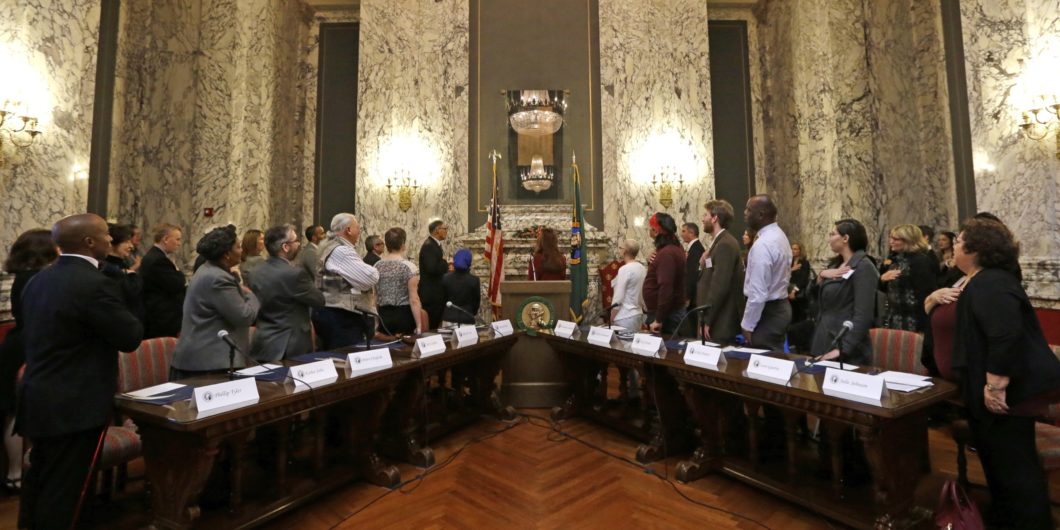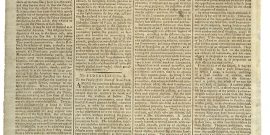What to make of Hamilton and Madison's darker thoughts on human nature as they appear throughout The Federalist?
Wanted: Faithful Electors
Last week, the Supreme Court heard oral arguments via teleconference in two cases brought by so-called “faithless” presidential electors—members of the Electoral College who voted for a presidential candidate other than the winner of their state’s popular vote (Hillary Clinton, in these cases). In one case, Colorado Department of State v. Baca, the elector was automatically removed upon casting his vote and replaced with an alternate elector who voted for Clinton as required. In the other, Chiafalo v. Washington, the electors’ votes were counted, but they were fined $1,000 pursuant to state law.
The constitutional question in these cases, as I shall try to demonstrate below, ultimately boils down to who, in the first instance, possesses the constitutional authority to choose the president—electors or states?
The constitutional provisions at issue come from Article II and the Twelfth Amendment. Article II, Sec. 1 states:
Each State shall appoint, in such Manner as the Legislature thereof may direct, a Number of Electors. . . but no Senator or Representative, or Person holding an Office of Trust or Profit under the United States, shall be appointed an Elector.
The Twelfth Amendment, altering the voting procedures in response to the partisan hijinks in the election of 1800, continues:
The Electors shall meet in their respective states and vote by ballot for President and Vice-President. . . and they shall make distinct lists of all persons voted for as President, and of all persons voted for as Vice-President, and of the number of votes for each, which lists they shall sign and certify, and transmit sealed to the seat of the government of the United States. . .
Some framers, most famously Alexander Hamilton in Federalist 68, anticipated a system in which the states select a refined group of electors to utilize their own judgment to select the president—they would be “faithful” only to their own wisdom and judgment. But the system never operated that way, with states instead selecting, on a partisan basis, electors already pledged to certain candidates. Today, this almost exclusively takes place through a statewide, winner-take-all popular vote, with the electors expected to be “faithful” to the will of the majority. So are electors simply the means by which the state exercises its authority to elect the president (utilizing whatever methods it chooses)? Or do they constitute an independent body tasked with selecting the president?
Text and Practice
The electors in these cases argue that the language used in the Constitution describes a body of independent voters who bear the ultimate responsibility for choosing the president. The word “elector” itself, they argue, essentially meant and continues to mean “one who chooses,” a definition that is backed up by the use of the same word defining the parameters of congressional electors in Article I. The word “vote” similarly implies the right to choose.
The state’s power, the electors claim, is limited to appointment. Once electors are appointed, the constitutional language indicates no role for the states. It is up to the electors themselves to “vote,” “make distinct lists,” “sign and certify” the lists, and “transmit” the lists to Washington.
Moreover, the electors argue, historical practice shows that no elector had ever been punished for his or her vote until 2016.
Finally, because electors hold an office established by the Constitution for the purpose of selecting a federal officer, they perform a “federal function,” which cannot be interfered with at the state level. The electors similarly note the importance of U.S. Term Limits, Inc. v. Thornton, which held that states could not place further qualifications on members of Congress beyond the ones identified in the Constitution.
The electors walk at least two fine lines in their argument. First, they do not argue that states are forbidden from requiring a pledge from their electors to vote for a particular candidate. (We’re not going back to Hamilton’s model of deliberating aristocrats.) They are somewhat limited on this point by the Court’s 1952 decision in Ray v. Blair, which upheld the use of such pledges by parties when choosing their slate of electors. Quoting McPherson v. Blacker (1892), the Ray court suggested that the role of elector in our modern system was “simply to register the will of the appointing power [the people through popular suffrage] in respect to a particular candidate.”
The electors, therefore, concede that such pledges and the partisan elector-selection method are constitutional, but simply argue that they are not legally enforceable. This may seem like a ridiculous distinction to make. But as the electors’ counsel, Lawrence Lessig, argued last Wednesday, this simply necessitates a division between legal limits and political/moral limits. Such a distinction may be seen in the kinds of “pledges” political candidates take when they ask us to “read my lips.” When promises are broken, there can be political consequences (in an elector’s case, the sacrifice of any future influence in the party), but there can be no legal ramifications.
If the Constitution established a system in which the states had complete control over the votes cast, why create a middleman?
Second, the electors seek to carve out a narrow power of the state to remove electors in other circumstances (if the elector refuses to show up for the vote, is convicted of bribery, etc…). This is perhaps the weakest link in their position, and several justices, especially Justices Kavanaugh and Alito, seemed concerned that the electors’ position would eliminate any power of the state to control genuinely rogue electors. Justice Breyer indicated that the electors ought to walk the narrow line by claiming, “the only thing a state cannot do is to punish the elector for the way he actually votes.”
The states, on the other hand, argue that the text of the Constitution does not require electors to have ultimate freedom in their choice for president. Words like “elector” and “vote” may often imply choice, but they don’t necessarily require it. Their primary textual argument—iterated time and time again at oral argument—is that the default rule is that “the power to appoint includes the power to remove.” And this principle seems plausible when considering the reasonable removal of electors for bribery or refusal to participate in the vote. All sides agree that states have the authority to select electors in any way and for any reason—including partisan ones. Why should they not have the authority to make replacements?
They also point to historical practice, especially the practice immediately following the founding. Bound electors emerged almost immediately, indicating that “elector” and “vote” were not taken to imply free choice. Moreover, the Twelfth Amendment, passed in response to the partisan screw-up of 1800, which almost saw the Democratic-Republican vice-presidential candidate Aaron Burr become president, seemed to accept and build around the common practice of binding electors by requiring separate ballots for each office, thus preventing organized, partisan electors from strategically undermining the opposing party.
The practice from the founding to the present, they argue, should serve as a guide if one finds the text of the Constitution ambiguous. The system, as it operates today, revolves around pledged electors, and when the people vote, they expect the electors to follow the majority. Roughly half of the states require legally binding pledges from their electors, and there have been several examples of states replacing electors for failure to appear for the vote. To upset that system by explicitly recognizing an elector’s right to ignore the popular decision may unnecessarily invite “chaos.” Finally, they point to both Ray and McPherson as evidence that the Court has embraced the new reality and established that the electors’ job is to serve as the agent of the state in the selection of the president.
Who Elects the President?
Though the justices seem to be leaning in their direction, the states’ argument never quite hits the mark on the key issue: do states really possess the power to control electors’ votes? They marshal considerable evidence that pledged electors are a long-standing practice that emerged almost immediately following the adoption of the Constitution; that states can and have removed electors for other reasons; that not all framers agreed with Hamilton’s vision of independent-minded electors; that the Twelfth Amendment accepted the practice of binding electors; and that previous Court decisions have leaned heavily in their direction. But none of these arguments exactly hit the mark, in that none of them show any textual or historical evidence that the state can actually control an elector’s vote.
The core issue, I believe, was broached only briefly in oral argument by Justice Kavanaugh. “What is the purpose of an elector?” he asked Colorado Attorney General Philip Weiser. What he was getting at is, if the states’ position is correct, why does the Constitution establish the office of elector at all? The Constitution grants to the states a certain number of “electors,” not “electoral votes.” If it established a system in which the states had complete control over the votes cast, why create a middleman? Why not simply grant a certain number of votes to be cast by a state government in the manner they see fit?
Weiser responded that the Electoral College simply gives the states a choice: choose a group of independent-minded free agents, or instruct your electors how to vote. But this answer is unsatisfying. Certainly, if the Constitution simply gave a certain number of votes to a state to be cast in any way it saw fit, the state would be free to create an independent body of electors on its own. But the Constitution requires that every state select a group of such electors and stipulates the manner in which they operate. The unavoidable conclusion seems to be that the electors, not the states, were to have the ultimate choice.
An Evolving System
The evolution of the Electoral College is a prime example of how much flexibility the Constitution’s text allows for future generations. By authorizing the states to select electors in any manner they choose, it allowed for the development of a system entirely different than the one (at least some) framers envisioned—no “living constitution” necessary.
The latest attempt to change the system without changing the Constitution—the National Popular Vote initiative (NPV)—would move even further from these framers’ ideas by having states bind their electors to the winner of the national popular vote rather than the state vote. Such a system would probably be allowable within the meaning of the Constitution (at least as the electors present its meaning in these cases). A ruling for either party in these cases would do little to derail the NPV, but the prospect of such changes should prompt us to consider both the limits and the propriety of past and future evolutions.
For better or worse, the Constitution established a body of electors to choose the president. So while there is considerable flexibility for evolution in the electoral system, that flexibility has its limits—the electors must elect.
As both political parties embrace more and more radical and divisive candidates, rhetoric, and ideologies, we might reasonably expect an uptick in the number of “faithless electors.” Should one of these votes ever alter the outcome of an election, it would certainly prompt a political crisis of colossal proportions, and that possibility may prompt the justices to rule in favor of the states. Yet there is an irony about this potentially disastrous hypothetical: it is precisely what some framers, like Hamilton, expected of the elector—that he be “faithful” to his judgment, not the majority. And of course, if we actually filled the office with those distinguished by their statesmanship and talent, instead of simply by the R’s and D’s after their names, perhaps the prospect of electors influencing our future wouldn’t be so terrifying.


